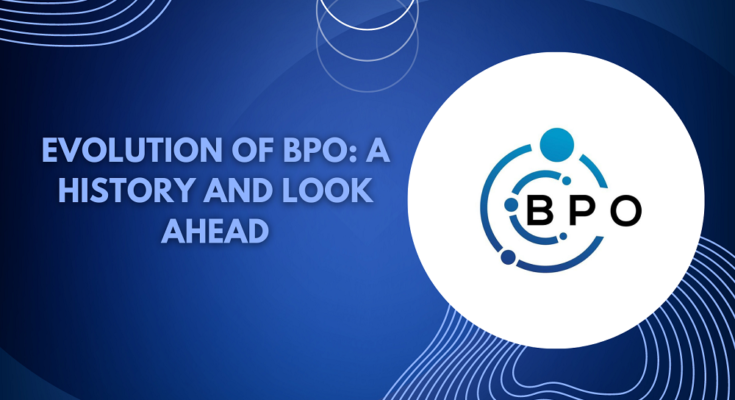Introduction
The realm of business process outsourcing (BPO) has emerged as one of the most rapidly expanding industries on a global scale. For decades, BPO service providers have been assisting businesses in managing a diverse range of tasks, spanning from customer support to accounting and beyond.
However, recent years have witnessed a remarkable transformation within the BPO landscape. Driven by technological advancements, intensified global competition, and an increasing demand for outsourcing services, the industry has undergone major shifts.
This blog will guide you through the evolution of the BPO industry while introducing you to the emerging BPO trends of 2023.
The Evolution of the BPO Industry
1. Where did it start?
The beginning of outsourcing traces back to a time before the internet dominated the business world. In those early days, BPO had strong ties to the industrial sector. It started as a straightforward solution for organizations seeking to reduce costs or fill gaps in their processes.
An exemplary case is the iconic brand Coca-Cola, which made its way into the American market during the late 1880s and gradually gained popularity. After nearly three decades, the company made a strategic decision to outsource part of its operations. In 1921, it formed a partnership with a local firm in the Philippines, marking its first foray into international bottling. By ‘outsourcing’ its production operations to the Philippines, Coca-Cola not only achieved cost savings but also established a strong presence in the Asia Pacific region.
This historical example showcases how early forms of outsourcing enabled companies to expand their global footprint while capitalizing on cost efficiencies. Little did they know that this humble beginning would lay the foundation for the transformative and data-driven partnerships we witness in today’s BPO landscape.
2. How is it going?
During the late 1990s, the internet revolutionized numerous industries, and the same held true for the world of BPO. Although the internet was not as advanced as it is today, it paved the way for the growth and development of the BPO industry, particularly in countries like the Philippines. Businesses increasingly began outsourcing non-core operations to cost-effective partners in countries such as India and China.
The demand and expansion of call centers and back-office support providers skyrocketed during this period. Companies seized the opportunity to gain a competitive edge by reducing costs and improving customer service through outsourcing non-essential tasks to specialized BPO companies.
Between 2000 and 2019, the BPO industry experienced growth, reaching a staggering global outsourcing value of over $91 billion. Third-party vendors now offer a wide range of services, including front-office functions like customer support, sales, and technical support as well as back-office tasks like administrative support.
Even small businesses have jumped on the outsourcing bandwagon, particularly in the wake of the Covid-19 pandemic, which witnessed a global surge in outsourcing IT support. As time goes on, the BPO industry will continue to evolve, with emerging trends taking center stage. This would be reshaping the BPO landscape, offering new opportunities for businesses seeking enhanced efficiency and growth.
Top BPO Trends for 2023
The BPO industry is going through a remarkable transformation, influenced by global events and technological advancements. Here are some of the latest trends shaping the BPO landscape:
1. Preference for remote workers
As the world grappled with the COVID-19 pandemic, remote work became the new norm, leading to an increased demand for remote workers in the BPO industry. This trend is expected to grow as companies seek cost-effective solutions that offer the same level of productivity and quality as traditional on-site arrangements. Advanced technologies such as enhanced data security, cloud computing, and virtual private networking (VPN) enable qualified individuals to work remotely, covering a range of roles from data entry specialists to call center reps and more.
While some organizations are gradually returning to office spaces, others have embraced a hybrid work model to cater to employees’ preferences. A recent survey reveals that 58% of employees prefer remote work while 39% opt for a hybrid arrangement.
2. Developing strategic partnerships
To enhance their capabilities and expand their reach, BPO providers are forging strategic partnerships with private and government organizations, including academic institutions, and healthcare entities. These collaborations facilitate the delivery of integrated and specialized services, keeping BPO providers at the forefront of innovation.
3. Improving customer experience with omnichannel solutions
BPO companies are adopting omnichannel solutions to deliver a seamless customer experience across multiple channels, including chat, voice, email, and social media. Herein, automation powered by AI technology is playing a crucial role in streamlining business operations, enhancing decision-making processes, and improving overall customer service. Today’s customers expect to interact with businesses through various channels, hence BPO providers are adapting accordingly to meet these expectations.
4. Focus on process automation
Process automation is the new weapon empowering BPO leaders to unlock ultimate efficiency. By leveraging cutting-edge technologies like robotic process automation (RPA) and Artificial Intelligence (AI), BPO service providers are automating repetitive tasks, reducing costs, and freeing up resources for value-added tasks. With automation driving the charge, companies are seen embracing a new era of service quality and digital transformation.
Why has BPO Become a Preferred Choice among the Top Businesses?
Here are a few reasons why most businesses are turning to business process outsourcing to drive operational efficiency and business growth:
1. The financial advantage
Cost efficiency is one compelling enough reason why businesses choose to outsource certain tasks. BPO companies specialize in hiring skilled professionals from diverse labor markets at a lower cost. By outsourcing tasks like IT help desk support, first-tier customer assistance, and content moderation, businesses can redirect their highly skilled team members to focus on more complex issues. This not only helps cut down on costs but also helps ensure a high-quality service across all functions.
2. Multilingual support
For businesses striving to expand globally, there’s often a need for multilingual marketing materials or customer-facing services. BPO vendors have the infrastructure to quickly hire local talent, proficient in various languages. More so, they handle the entire hiring process, including language tests and skills assessments. This eliminates the need to establish foreign entities or invest in language assessment resources.
3. Around-the-clock support
Scaling businesses often require round-the-clock services. BPO companies can provide 24/7 support or handle business development in new geographical locations more efficiently. They possess expertise in staffing models to cover different holiday schedules, provide redundancy for sick leave and vacations and manage task hand-offs seamlessly. This allows businesses to have local employees working in their respective time zones.
4. Scaling made simple
Certain businesses experience seasonal fluctuations or unexpected spikes in demand. And when scaling rapidly, the endless cycle of hiring can be overwhelming. Top BPO firms often have a pool of assessed candidates ready to fill suitable roles, allowing for quick onboarding. They offer the flexibility to scale up temporary teams or provide shared services where employees are available on an as-needed basis. This eliminates the need for extensive recruitment, training, and onboarding processes, saving both time and resources.
Conclusion
The evolution of Business Process Outsourcing has been nothing short of remarkable. From its humble beginnings as a cost-saving strategy to its current state as a transformative force in the global business landscape, BPO has undergone significant changes and adaptations. By embracing technological advancement and leveraging global talent, BPO service providers are redefining the way organizations operate. As businesses embrace this evolution, they can leverage the full potential of BPO to drive efficiency, innovation, and sustainable success in the dynamic global marketplace.




